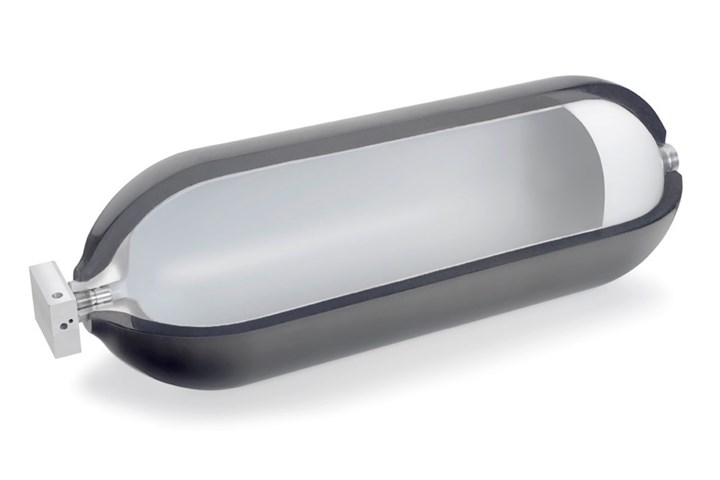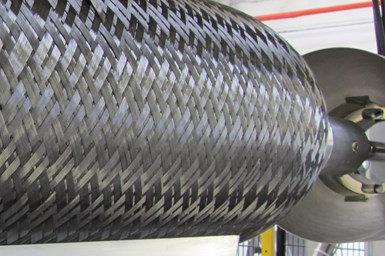BBG presents self-closing HP-RTM molds for CFRP compact hydrogen tank production
The autonomous concept, sufficient for series production, enables lower investment costs. Up to 15 cylinders can be produced simultaneously per operation.

Photo Credit: BBG
Machinery manufacturer BBG GmbH & Co. KG (Mindelheim, Germany) has presented on Sept. 16 a concept for self-closing high-pressure resin transfer molding (HP-RTM) molds that enables quick and reproducible manufacturing of compact, modular carbon fiber-reinforced plastic (CFRP) hydrogen tanks for a variety of vehicles. Sufficient for series production, the process does not require a press or further production equipment, such as autoclaves for curing.
According to BBG, since compact tanks are made of individual CFRP cylinder modules, they can be tailored precisely to the installation space available in a vehicle. Further, a tank filled with 700 bar internal pressure is said to facilitate a range that is similar to those offered by internal-combustion engines for hydrogen-powered passenger and commercial vehicles.

Figure 2. The inner shells of the cylinders, which are also referred to "liners" are overbraided with carbon fiber. Photo Credit: BBG
During the product process, says BBG, the inner shells of the cylinders (referred to as “liners”) are overbraided with carbon fiber (Fig 2). Then, the prepared blanks are inserted into a two-part mold; up to 15 cylinders with a diameter of 50 millimeters or more can be produced simultaneously per operation. A low-viscosity, resin-based mixture is injected under a high level of pressure once the heated mold has closed autonomously. This mixture penetrates the carbon-fiber braid, enclosing the individual fibers evenly and without defects in the process. After curing in the mold, BBG notes, the finished pressure-resistant components can be removed and assembled to form a tank.
According to the company, in comparison to other processes, the series production capability enables low investment cost. More importantly, replacing large cylindrical hydrogen storage units by more compact tanks and the reduction of production cost play an large role in the development of fuel cell vehicles. Among other initiatives, the research project Bryson, in which TU Dresden (Dresden Technical University), Hochschule München (Munich University) and Leichtbauzentrum Sachsen (LZS; Dresden, Germany) and BMW (Munich, Germany) participate, is looking for solutions to this problem.
"Since the high pressure applied to hydrogen tanks requires a great deal of component stability, we attach particular importance to maximum precision in the design and production of HP-RTM molds,” notes Gerhard Hörtrich, project and sales manager at BBG. “For the production of the hydrogen tanks to be as efficient as possible at the same time, we have developed and integrated a reliable sealing system, among other things. This system ensures that virtually no manual reworking is required when the resin mixture is processed.”
Related Content
-
Noble Gas Systems 350-bar conformable pressure vessels pass HGV2 standard tests
Conformable tanks with new materials pass technical tests for hydrogen storage, to compete with Type IV pressure vessels using CFRP.
-
Co-molding SMC with braided glass fiber demonstrates truck bed potential
Prepreg co-molding compound by IDI Composites International and A&P Technology enables new geometries and levels of strength and resiliency for automotive, mobility.
-
Corebon, Composite Braiding partner to enhance TPC manufacturing
Collaboration aims to overcome production limitations with tubular thermoplastic composites (TPC) by using induction-heated tooling and high-quality commingled braids.















